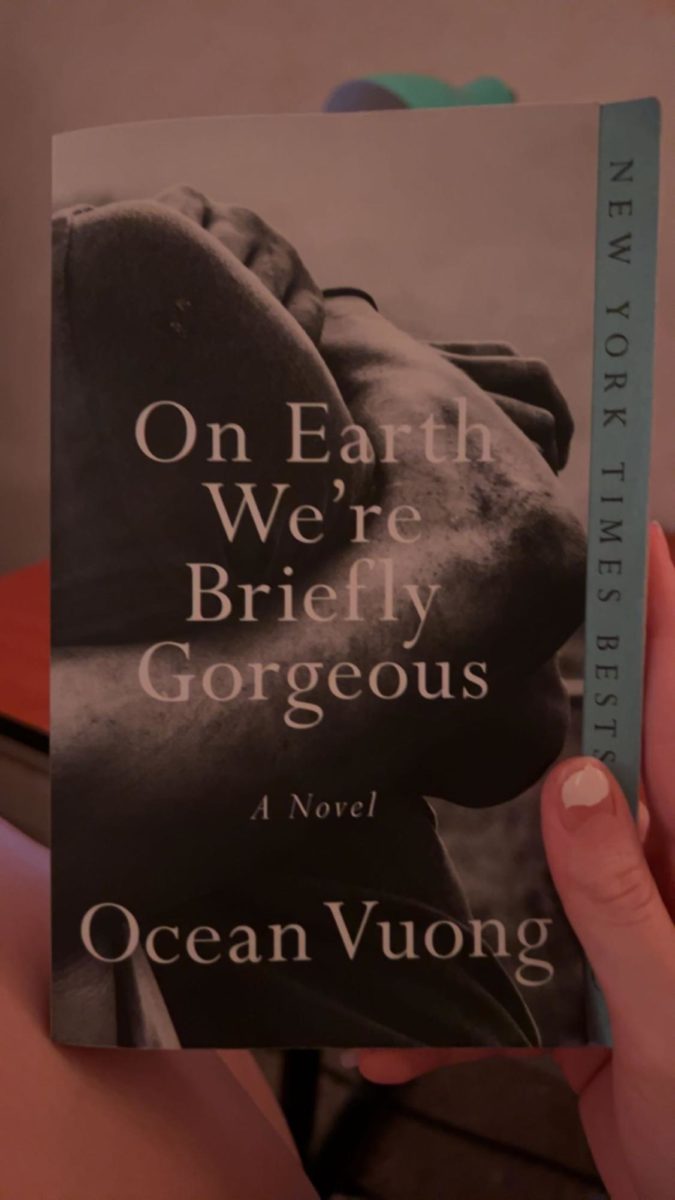Ocean Vuong’s debut novel, “On Earth We’re Briefly Gorgeous” deserves a grander introduction than I can give. Published in 2019, this semi-autobiographical work is structured as a letter from a son to his illiterate mother, revealing a profoundly moving narrative. Its rightful place on the New York Times Bestseller list is a testament to its impact.
Vuong masterfully weaves his experiences as an immigrant and a gay man into the fabric of this novel, resulting in a heartbreaking, captivating and beautiful work of art.
At the heart of the story lies, Little Dog, a young Vietnamese American, who is grappling with his identity and heritage. Little Dog is in his 20s as he writes to his mother, revealing a family history rooted in Vietnam, that began long before he was born. He navigates class, race, sexuality, the American dream, masculinity and the contemporary state of America today as he tries to gather his thoughts for his mother. Little Dog’s prose is poetic and stands in poignant contrast to the exploration of past trauma that haunts him and his family.
The novel unravels the stories of his mentally ill, PTSD-stricken mother, and his schizophrenic grandmother, survivors of the harrowing Vietnam War. Through their eyes, we witness the agonizing journey of immigration in America where Little Dog’s mother works at a nail salon and even once strikes him with a Lego set. The depiction of his childhood years in Hartford, Connecticut, where the concept of “color” assumes new dimensions, leads him to an encounter with Trevor, his first love. Little Dog writes, “color was one of the first things we knew of yet knew nothing about.”
The last section of the book stands as Vuong’s triumph, drawing together a multitude of themes encompassing survival, freedom, beauty, mental health, addiction, and the immigrant experience in America. I found myself annotating and shedding more tears than I ever have reading a book. Vuong’s prose, both graceful and concise, confronts the darkest aspects of human existence, shedding light on the most unsettling parts of our nature.
One passage that resonates deeply captures Little Dog’s vulnerability: “Days I feel like a human being, while other days I feel more like a sound. I touch the world not as myself but as an echo of who I was. Can you hear me yet? Can you read me?” This poignant exploration of vulnerability echoes throughout the novel, making readers question their understanding of humanity itself. Another powerful line unearths the commodity that is human suffering: “Did you know people get rich off of sadness? I want to meet the millionaire of American sadness. I want to look him in the eye, shake his hand, and say, ‘It’s been an honor to serve my country.’” The eerie concept of profiting from others’ distress is exposed in Vuong’s writing.
Vuong’s portrayal of imperfect characters, each damaged by their flaws, elevates the novel even further. This authenticity makes the story relatable and deeply profound, reminding us of our shared humanity.
Vuong also discusses the concept of masculinity, unveiling societal expectations that suppress vulnerability with phrases like “boys don’t cry” and emphasizing the need to be “strong” and “big” to be a “real boy.”
One line reads: “. . .he cried skillfully in the dark. The way boys do.”
Growing up, Little Dog was bullied by other boys in the neighborhood for riding a pink bike.
Vuong also discusses the language used for praise when it comes to creativity: “You killed that poem, we say. You’re a killer. You came in to that novel guns blazing. . .”
Vuong’s exploration of masculinity intersects effortlessly with discussions on race, class and sexuality, resulting in a narrative that is both powerful and poignant. This novel’s depth and tragedy find revelation in many breathtaking quotes, each serving as a tribute to Vuong’s introspective prose. His writing, thoughtfully crafted, offers insights into society’s most pressing issues.
Ocean Vuong is a once-in-a-generation writer, and I am so grateful that I am alive to read his work. His contribution to literature is nothing short of exceptional and this novel stands as an outstanding piece of art.
“On Earth We’re Briefly Gorgeous” entices readers to read it at least once in their lifetimes. Its timeless relevance demands readers to discover meaning amid the world’s chaos.
So, in a world where our moments of beauty are fleeting, Vuong’s work stands eternal, reminding us of the everlasting impact of his words.
Novel’s depth, tragedy make impact
Emma Coss, IV Leader Editor
September 7, 2023
Ocean Vuong’s novel “On Earth We’re
Briefly Gorgeous” weaves his experiences as an immigrant and a gay man.
0
Tags:

